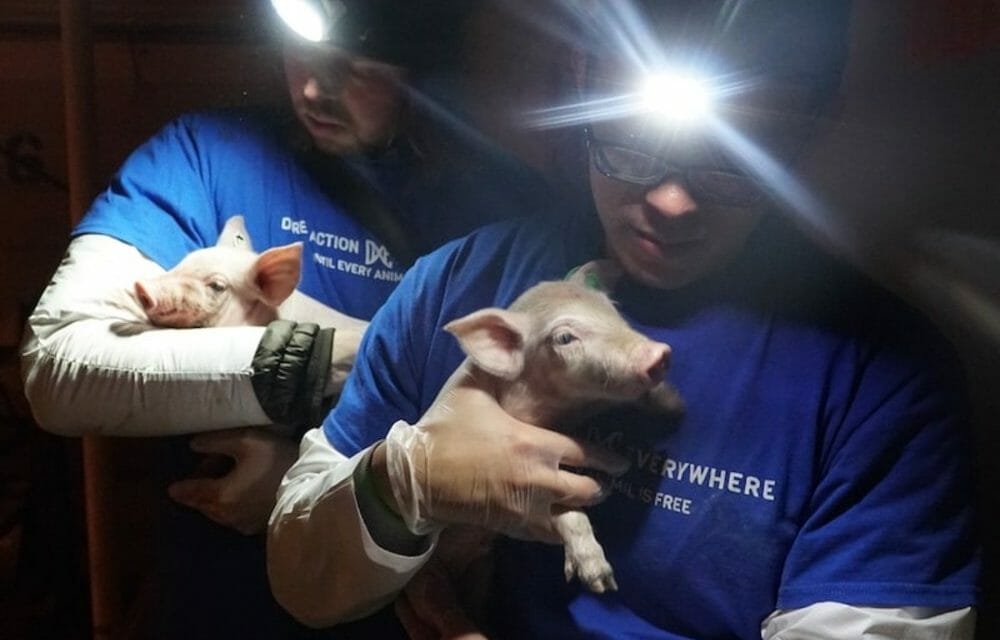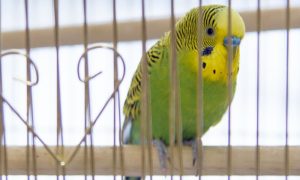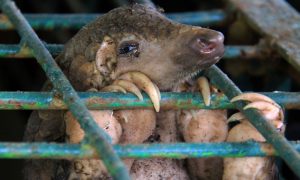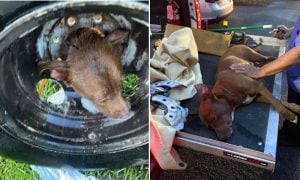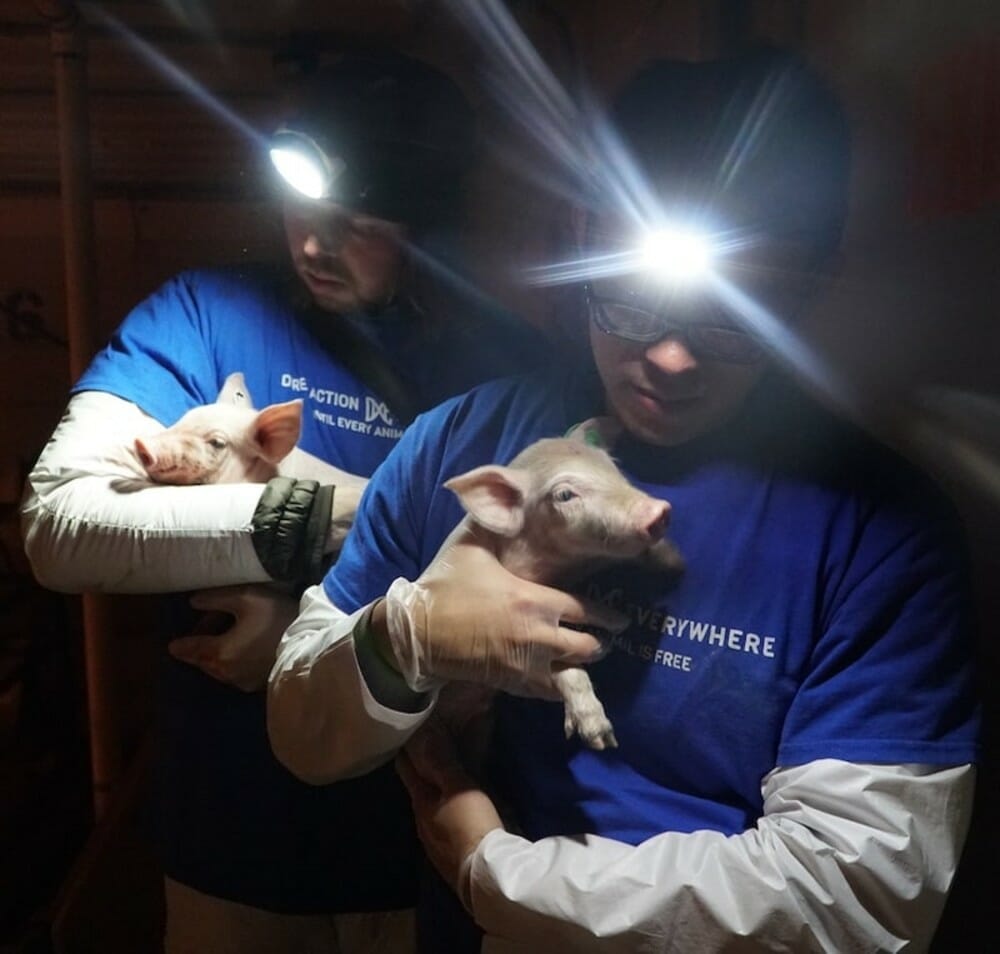An 8-person jury returned a unanimous verdict that rescuers who removed two sick and dying piglets from a Smithfield factory farm in Utah five years ago were not guilty of theft or burglary.
The landmark decision, which proponents say establishes the “right to rescue” severely distressed or dying animals from cruel situations, followed more than seven hours of deliberation after a week-long trial of Direct Action Everywhere (DxE) Founder Wayne Hsiung and DxE member Paul Picklesimer.
DxE, founded in 2013, has a mission to “achieve revolutionary social and political change for animals in one generation” and rejects the mass torture and killing of sentient animals.
Using the “open rescue” model, Hsiung, Picklesimer, and three other members entered Beaver County’s Circle Four Farm in 2017 — a pig producer owned by Smithfield — and videotaped conditions inside including dead piglets and bloody mother pigs screaming and gnawing on the metal gates of their cramped crates, according to the video as released by The New York Times.
DxE also removed two severely underweight piglets — one with an injured foot, whom they named Lily, and a second runt with blood and scabs on her face, whom they named Lizzie. DxE told viewers the piglets likely would not have survived without the intervention, emergency medical care, and transportation to an animal sanctuary to allow them to recover.
But the State of Utah didn’t see it that way, instead alleging that the rescuers had committed multiple counts of felony burglary and a misdemeanor count of theft — initial charges of which carried up to 10 years in prison.
5th District Court Judge Jeffrey Wilcox agreed to throw out the first burglary charge for both rescuers, which related to their entering a gestation barn, after Mary Corporon — Picklesimer’s attorney — noted that the rescuers couldn’t have “intended” to take piglets from the building. Piglets typically aren’t inside a gestation barn, since it’s where mother pigs stay before they give birth.
The remaining counts hinged on whether the two piglets, removed from the brink of death, had any “value” to Smithfield.
State prosecutors said that because the piglets were alive and tagged, they had value to Smithfield. In testimony that was later stricken from the record in its entirety, a Smithfield worker also alleged that the company provided needed medical care to animals and had two veterinarians on staff in 2017 — although the same worker testified earlier in the trial that he had not noticed the missing piglets until the airing of DxE’s rescue video, published a month later.
Hsiung, during a cross examination of the worker, calculated that Circle Four Farm’s annual output of 1.2 million pigs meant that each staff vet would be responsible for overseeing the well-being of 1,600 pigs per day. He — as well as Veterinarian Sherstin Rosenburg, who also testified during the trial — said what was much more likely was that Lily and Lizzie would have been among the estimated 15 percent of piglets who die and are discarded.
“We only take animals in need of medical care,” he told jurors. “When we take an animal out, it is an act of mercy, because they need help… One of the things we’ve been consistent about is that we never intended to take something of value to Smithfield.”
Hsiung’s words were eched by an unlikely witness, turkey farmer Rick Pitman.
Pitman told jurors he had met Hsiung and Picklesimer when they showed up, along with dozens of other DxE members, to protest conditions at his turkey farm.
Pitman refused to describe his interactions with DxE as “confrontations” and instead said the ongoing conversations had helped him take care of his animals better. He also refused to say that DxE’s actions had cost him economically, although the organization did remove one of his turkeys from a nearby farm.
“There’s a difference between stealing a turkey and causing economic damage and rescuing a turkey that’s suffering,” he said.
Wilcox, the judge, largely blocked all references to animal welfare and animal cruelty throughout the trial — not allowing the rescuers to show their real-time footage, demanding that they cut in half a picture of one of the rescued piglets that also showed her mother’s bloody teat, and deflecting all attempts to describe for jurors the conditions at the farm in which the pigs were found.
While those actions have catalyzed criticism from legal scholars about the transparency with which the case was handled, Hsiung took the unanimous not-guilty verdict as a hopeful sign that meaningful change for animals can happen anywhere.
“This is a resounding message about accountability and transparency,” Hsiung said in an interview following the jury’s decision. “Every company that is mistreating its animals and expecting that government and local elected officials will just go along with them because they have them in their pockets will now realize that the public will hold them accountable, even in places like Southern Utah.”
The case originally was scheduled to be heard in Beaver County, where Circle Four Farms is located, but was relocated to Washington County after concerns about choosing an impartial jury surfaced — jury questionnaires revealed a majority of possible jurors had direct ties to the animal agriculture industry or local law enforcement.
A Message For Factory Farms — The World Is Watching
Cheers erupted in the courtroom following jurors dismissing all four counts against the rescuers.
Cheers were also heard outside the courtroom, where DxE members not allowed inside had gathered. The #SmithfieldTrial account on Twitter, through which select DxE members provided updates on the trial, topped more than 3,000 followers by the trial’s end.
Smithfield Foods’ social media accounts, following the trial, also revealed hundreds of comments left by outraged posters regarding the conditions for animals that the trial had revealed.
Jim Monroe, Smithfield Foods’ vice president of corporate affairs, said in a written statement following the trial, saying, “This verdict is very disappointing as it may encourage anyone opposed to raising animals for food to vandalize farms.”
That statement met with immediate criticism from notable welfare leaders.
“This case did not involve vandalizing a farm,” Gene Baur, founder of the renowned Farm Sanctuary, posted in response. “It was about rescuing weak animals who would die in mistery. Let’s hope this case pushes Smithfield and others to act with more kindness and empathy to individuals over whom they have power and control.”
Renowned animal welfare leaders applauded the decision on social media, including Peter Singer, who Tweeted out, “Wonderful news – even in conservative rural Utah, a jury won’t convict heroes who rescue piglets from factory farms!”
Wonderful news – even in conservative rural Utah, a jury won't convict heroes who rescue piglets from factory farms! https://t.co/czFn2qISmB
— Peter Singer (@PeterSinger) October 10, 2022
David Fathi, the American Civil Liberties Union (ACLU)’s National Prison Director, tweeted out a single word for Hsiung and Picklesimer: “Heroes.”
Others have since attributed the case’s strange circumstances – of a corporate animal agriculture facility being able to mobilize eight FBI agents to track down piglets reportedly valued at a maximum of less than $100, across state lines and to initiate a 5-year-investigation — to corporate corruption, suppression of animal cruelty, and a key sign that the system needs to change.
“Whatever the verdict, this case has exposed so much about the factory farming industry’s power, credibility, and cruelty,” tweeted Lewis Bollard, the Farm Animal Welfare Program Officer at Open Philanthropy.
Matthew Strugar, an attorney involved in overturning several statutes referred to as “ag-gag” laws for their aim to cloak what happens to animals behind closed doors, said state and federal authorities have consistently shielded factory farms from transparency and accountability.
But he added the Smithfield trial took that dynamic to a new level.
“In nearly two decades of legal work, this case is one of the most egregious I’ve seen, in terms of denying defendants’ constitutional right to a rigorous defense,” Strugar said.
Justin Marceau, a law professor at the Brooks Institute Faculty who also served as a character witness for Hsiung, said the case will have ripple effects.
“Prosecutors would have you believe this case is about burglary, but in reality, it’s a case about whether people can rescue animals in dire conditions that are now commonplace in our food system,” he said. “I can’t think of a more significant animal law case in recent history.”
Heroes. @DxEverywhere @SmithfieldTrial https://t.co/vyHlTcuPE8
— David Fathi (@DavidCFathi) October 9, 2022
What Could This Case Mean For Animal Rights and Welfare?
Hsiung, who represented himself during trial, closed his arguments with a compelling call to compassion despite the strictures the court had set to reference animal welfare.
He told jurors he didn’t want them to acquit him on a legal technicality – such as whether the piglets met the definition of “value” or whether DxE’s actions met the legal definitions for “theft” or “burglary” – but instead as a matter of conscience.
“The animals of this earth have given us so much,” he said. “All they’ve asked for in return is that we be good stewards of their care. If you defend our right to give aid to dying animals, defend the right of all citizens to aid dying and sick and injured animals, there are some things that will happen in this world.
“Companies will be a little more compassionate to the creatures under their stewardship,” he continued. “Governments will be a little more open to animal cruelty complaints. And maybe, just maybe, a baby pig like Lily won’t have to starve to death on the floor of a factory farm.”
While DxE noted the powerful precedent set by the case, the organization almost immediately pointed public attention to additional upcoming court cases for rescuing animals from similar situations.
“We won the #SmithfieldTrail but there is a lot of work still to be done,” @SmithfieldTrial tweeted. “We have three rescue trials coming up in Wisconsin and California, and there are still billions of animals in cages who deserve to be free, just like Lily and Lizzie.”
Everyone can help save pigs just like Lizzie and Lily every day by opting for kind, plant-based options, and urging friends and family to do the same.

